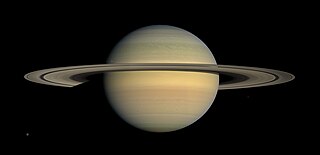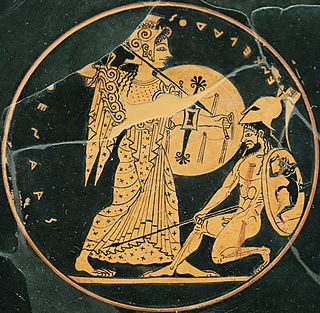Phoebe or Phœbe may refer to:

Saturn is the sixth planet from the Sun and the second-largest in the Solar System, after Jupiter. It is a gas giant with an average radius of about nine and a half times that of Earth. It has only one-eighth the average density of Earth, but is over 95 times more massive.

Enceladus is the sixth-largest moon of Saturn. It is about 500 kilometers in diameter, about a tenth of that of Saturn's largest moon, Titan. Enceladus is mostly covered by fresh, clean ice, making it one of the most reflective bodies of the Solar System. Consequently, its surface temperature at noon only reaches −198 °C, far colder than a light-absorbing body would be. Despite its small size, Enceladus has a wide range of surface features, ranging from old, heavily cratered regions to young, tectonically deformed terrain.

Mimas, also designated Saturn I, is a moon of Saturn discovered in 1789 by William Herschel. It is named after Mimas, a son of Gaia in Greek mythology.
An elf is a mythological creature, originally from Germanic mythology.

In Greek mythology, Enceladus was one of the Giants, the offspring of Gaia (Earth), and Uranus (Sky). Enceladus was the traditional opponent of Athena during the Gigantomachy, the war between the Giants and the gods, and was said to be buried under Mount Etna in Sicily.

In Greek mythology, Pontus was an ancient, pre-Olympian sea-god, one of the Greek primordial deities. Pontus was Gaia's son and has no father; according to the Greek poet Hesiod, he was born without coupling, though according to Hyginus, Pontus is the son of Aether and Gaia.

Fornjot or Saturn XLII is the third outermost natural satellite of Saturn. Its discovery was announced by Scott S. Sheppard, David C. Jewitt, Jan Kleyna, and Brian G. Marsden on 4 May 2005 from observations taken between 12 December 2004, and 11 March 2005. It had the largest semi-major axis among all the known moons of Saturn until the recovery of Saturn LVIII in 2019.

Hati or Saturn XLIII is a natural satellite of Saturn. Its discovery was announced by Scott S. Sheppard, David C. Jewitt, Jan Kleyna, and Brian G. Marsden on 4 May 2005, from observations taken between 12 December 2004 and 11 March 2005.

Bestla or Saturn XXXIX is a retrograde irregular moon of Saturn. Its discovery was announced by Scott S. Sheppard, David C. Jewitt, Jan Kleyna, and Brian G. Marsden on 4 May 2005, from observations taken between 13 December 2004 and 5 March 2005.
Themis is one of the twelve Titan children of Gaia and Uranus in Greek mythology.
Calais is a city in France. The name can also refer to:
Loge or Saturn XLVI is a natural satellite of Saturn. Its discovery was announced by Scott S. Sheppard, David C. Jewitt, Jan Kleyna, and Brian G. Marsden on 26 June 2006, from observations taken between January and April 2006.
Aetna was in Greek and Roman mythology a Sicilian nymph and, according to Alcimus, a daughter of Uranus and Gaia or of Briareus. Stephanus of Byzantium says that according to one account Aetna was a daughter of Oceanus. Simonides said that she had acted as arbitrator between Hephaestus and Demeter respecting the possession of Sicily. By Zeus or Hephaestus she became the mother of the Palici.
Actaeon or Acteon (Ἀκτέων) was a hero in Greek mythology.

In Ancient Greek religion and mythology, Cronus, Cronos, or Kronos was the leader and youngest of the first generation of Titans, the divine descendants of the primordial Gaia and Uranus. He overthrew his father and ruled during the mythological Golden Age, until he was overthrown by his own son Zeus and imprisoned in Tartarus. According to Plato, however, the deities Phorcys, Cronus, and Rhea were the eldest children of Oceanus and Tethys.
The following outline is provided as an overview of and topical guide to Saturn:

The Gaia Sausage or Gaia Enceladus is the remains of a dwarf galaxy that merged with the Milky Way about 8–11 billion years ago. At least eight globular clusters were added to the Milky Way along with 50 billion solar masses of stars, gas and dark matter. It represents the last major merger of the Milky Way.









